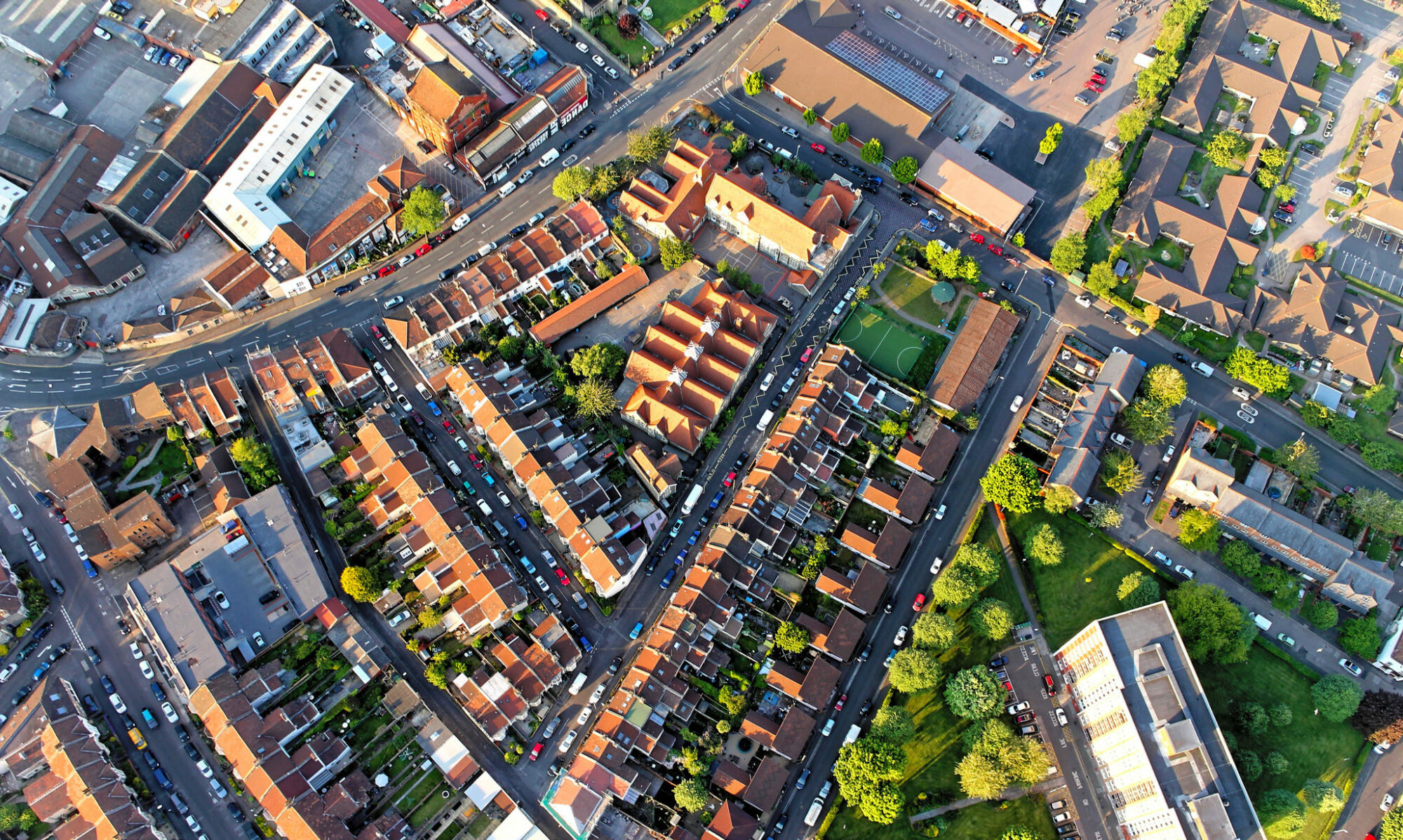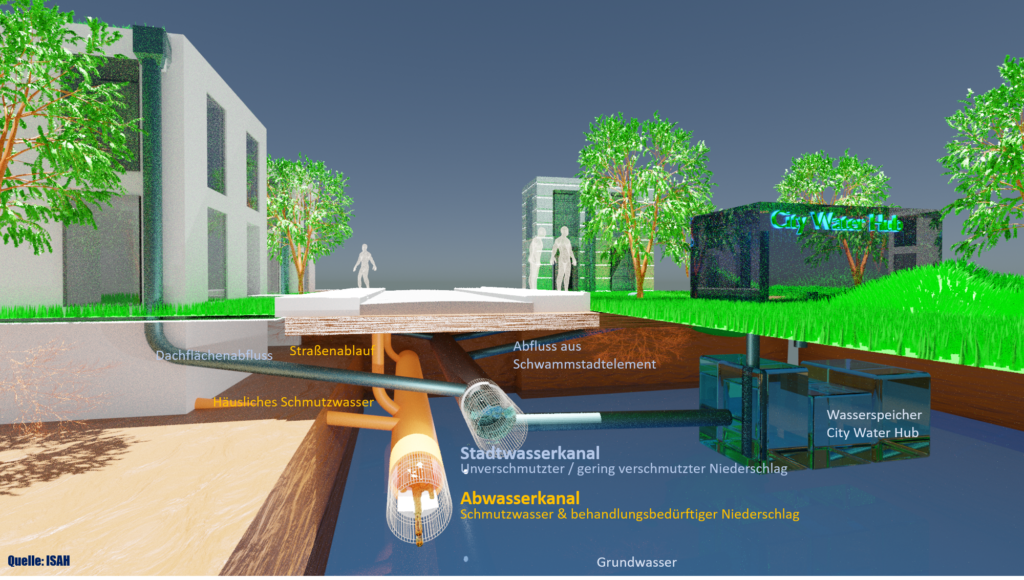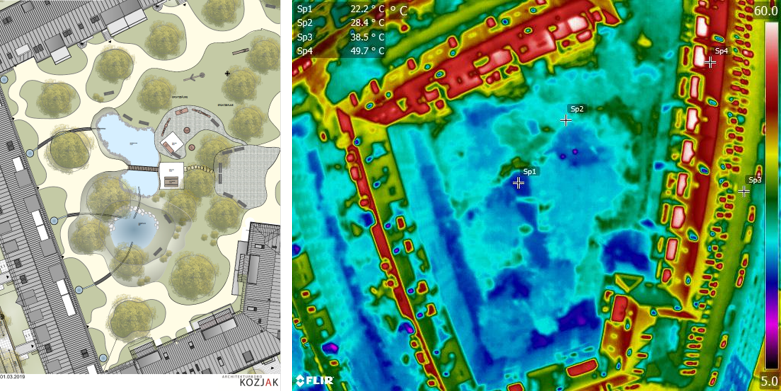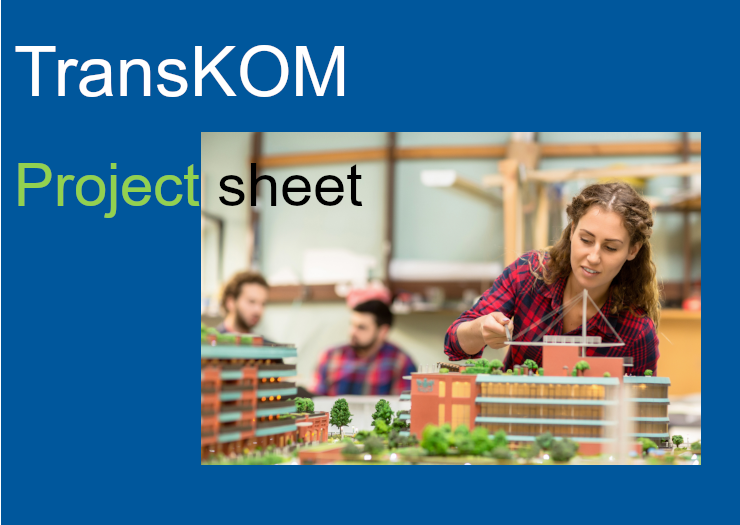TransKOM – Integration of resource-optimized separation drainage through transformation of municipal planning processes for existing neighbourhoods
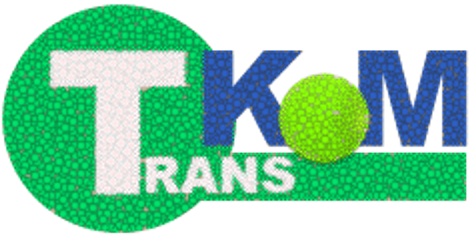
Adapted water management (damage-free drainage + use-oriented retention) is a central task of climate-adapted urban development and cannot be developed by urban drainage alone, especially in existing urban areas. In addition to the new administrative process StadtQuartier2050+ initiated in TransMiT as the basis for institutionalised strategic neighbourhood development, the integral concept of quality-based separate drainage (qbTE) is being further developed in a practical manner in TransKOM.
Integral strategic planning at neighbourhood level prerequisite for urban transformation
In order to establish new approaches to climate-adapted and resource-optimised urban development in existing neighbourhoods, the urban development requirements must be synergistically linked with the water management aspects of the transformation of urban drainage in the long term. It became clear that, in addition to the reorientation of drainage (qbTE) in existing neighbourhoods, the development and implementation of an interdisciplinary planning process at the strategic-framework level is essential for this, so that the structural deficits that impede the networking and planning coordination desired by all participants can be overcome. The strategy process “City-Quarter 2050+” developed in TransMiT for existing urban quarters (as opposed to new planning or extensive conversion) supports the concrete implementation of measures through i) upstream identification of existing conflicting goals in the individual neighbourhood, ii) the subsequent analysis of alternatives independent of individual measures with iii) final documentation of the neighbourhood-specific interdisciplinary transformation plan. The strategic process is being tested in Hanover for two inner city neighbourhoods. It is already evident that the jointly developed information- and knowledge-based basis for decision-making significantly reduces conflicts and enables long-term strategic decisions.
Quality-based separation drainage – a new drainage strategy
The central urban water management question posed in TransMiT, “What direction should urban drainage systems take in the context of the challenges facing the entire city?” is answered with concept of quality-based separation drainage. The concept focuses on (precipitation) water quality and opens up concrete and low-threshold rainwater utilisation options (at neighbourhood level) with smart use of existing drainage infrastructure by separating the (waste) water flows according to quality. In this way, low-quality water flows in the combined sewer are directed towards optimal treatment and, at the same time, higher-quality partial flows are retained for use in the neighbourhood. The above-ground neighbourhood design is included in the concept across sectors, e.g. by coordinating suitable (construction) material selection or defined land use to ensure good rainfall quality. If water management and urban development go hand in hand here, the vision of establishing an additional urban water supply component fed by locally collected precipitation is feasible. The core technical elements of the qbTE are i) the wastewater switch, ii) the smart forecast-based runoff control and iii) the neighbourhood-specific management of the precipitation-based water supply with user-oriented treatment.
Application in practice
In the TransKOM, the concept of quality-based separation drainage (qbTE) and the newly initiated administrative process “Stadt-Quartier 2050+” will be tested and further developed in practice as the basis for institutionalised strategic neighbourhood development and institutionalised in the sense of process continuation. The strategy of quality-based separation drainage and the integral planning processes “Stadt-Quartier 2050+” are brought together and further developed from the previously achieved system readiness level SRL 4/5 to operationalisation (SRL 7/8) via implementation and testing in Hannover and Hildesheim.
Project title
TransKOM – Integration of resource-optimized separation drainage through transformation of municipal planning processes for existing neighbourhoods
Internet
transkom-projekt.de
Duration
01.09.2022–31.08.2024
Funding code
033W105AN
Funding
1.400.000 €
Contact
Dr. Maike Beier
Leibniz Universität Hannover
0511 762-2898
beier@isah.uni-hannover.de
Project partners
Leibniz Universität Hannover, Institut für Siedlungswasserwirtschaft und Abfalltechnik
Universität Leipzig, Institut für Infrastruktur und Ressourcenmanagement
Landeshauptstadt Hannover
Stadt Hildesheim
Stadtentwässerung Hildesheim AöR
Spar- und Bauverein eG, Hannover
Bpi Hannover – Verworn beratende Ingenieure
GEO-NET Umweltconsulting GmbH, Hannover
Version of
Mai 2023
Information on the first funding phase (2019 – 2022) can be found here
Results
Results of the second funding phase
Results of the first funding phase
Results of 2019 – 2022 –
Contribution to the publication of the results of the first funding phase Technische und institutionelle Bausteine zur strategischen Quartiersentwicklung in Richtung Klimaresilienz
Results of 2021 – Contribution to the RES:Z-Newsletter 3:
Risikobewertung “Hygiene” für Wasser in der Stadt: Quantitative Mikrobielle Risiko Analyse (QMRA),
Blaue Infrastrukturelemente reduzieren die Hitzelast eines innerstädtischen Innenhofs (Messungen zu lokalem Mikroklima),
Simulation zeigt deutliches Potenzial einer qualitätsbasierten Trennentwässerung (qbTE),
Großtechnische Erprobung zur Umfahrung der Belebung bestätigt Potentiale einer erhöhten Annahmemenge von Regenwasser
Results of 2020 – Contribution to the RES:Z-Newsletter 2:
Datenerfassung und -analyse zur Erzeugung eines 2D-Oberflächenabflussmodells,
Baumrigolen zur Regenwasserbewirtschaftung,
Niederschlagswasserbelastung – Monitoring und Versuchsbetrieb starten,
Modelltechnische Untersuchung der qualitätsbasierten Entwässerung,
Klimamessung im Innenhof
Results of 2019 – Contribution to the RES:Z-Newsletter 1:
Ein Forschungsprojekt der integralen Stadt- und Quartiersplanung,
Forschungsschwerpunkt Systemintegration,
Forschungsschwerpunkt Blau-grüne Infrastrukturen,
Betrachtungen zu Nutzen und Finanzierungsstrategien von ortsnahen Systemelementen der Siedlungsentwässerung,
Belastung von Niederschlagswasser mit Bioziden aus Gebäudefassaden
Publications
Czorny, E.; Schmidt, D.; Elsner, K.; Beier, M. (2020): Resilienzstärkung urbaner Quartiere – Reduzierte Hitzebelastungdurch Integration des Wassersektors. In: Transforming Cities 2020 (1), S. 70-74.
Kabisch, N.-K.; Hornig, S.; Bauerfeld, K.; Beier, M. (2020): Urbane Entwässerung neu gedacht. In: Transforming Cities 2020 (1), S. 75-81.
Kabisch, N.-K.; Beier, M.; Köster, S. (2021): Qualitätsbasierte Entwässerung von Niederschlagswasser. Potenzialanalyse am Beispiel der Stadt Hildesheim. In: Korrespondenz Abwasser, Abfall, Heft 9 (68), S. 709-721.
Beier, M.; Gerstendörfer, J.; Mendzigall, K.; Pavlik, D.; Trute, P.; von Tils, R. (2022): Climate Impact and Model Approaches of Blue-Green Infrastructure Measures for Neighborhood Planning. Sustainability 2022, 14, 6861.
